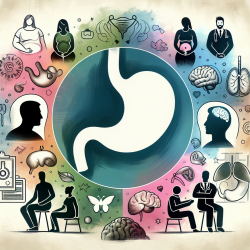Introduction
In the realm of genetic disorders, Cohen Syndrome (COH1) is a rare and intriguing condition characterized by a combination of ocular, neural, and muscular deficits. A recent study, "Novel VPS13B Mutations in Three Large Pakistani Cohen Syndrome Families Suggests a Baloch Variant with Autistic-Like Features," sheds light on the genetic underpinnings of this syndrome, offering valuable insights for practitioners working with affected individuals. This blog post explores the study's findings and their implications for practitioners in the field.
Understanding the Study
The study focused on three large consanguineous Pakistani families with a history of intellectual disability and, in some cases, autistic traits. Researchers identified two novel homozygous deletion mutations in the VPS13B gene, which are associated with Cohen Syndrome. Notably, these mutations were found in families from the Baloch sub-ethnic group, suggesting a founder effect among this population.
Key Findings
- The study identified a 1 bp deletion, NM_017890.4:c.6879delT, and a deletion of exons 37-40 in the VPS13B gene.
- Individuals with the c.6879delT mutation exhibited autistic-like traits, contrasting with the "friendly" demeanor often associated with Cohen Syndrome.
- The c.6879delT mutation may be a common cause of COH1 and similar phenotypes among the Baloch population.
Implications for Practitioners
For practitioners, the study offers several key takeaways:
- Early Identification: Understanding the genetic basis of Cohen Syndrome can aid in early diagnosis and intervention, particularly for families with a Baloch heritage.
- Personalized Interventions: Recognizing the potential for autistic-like traits in individuals with the c.6879delT mutation allows practitioners to tailor interventions to meet specific needs.
- Genetic Counseling: The study underscores the importance of genetic counseling for families with a history of Cohen Syndrome, helping them understand the risks and implications of the disorder.
Encouraging Further Research
While the study provides valuable insights, it also highlights the need for further research. Practitioners are encouraged to explore the following areas:
- Broader Genetic Studies: Expanding genetic research to include diverse populations can help identify additional mutations and their effects.
- Longitudinal Studies: Long-term studies can provide a deeper understanding of the progression of Cohen Syndrome and its impact on individuals and families.
- Intervention Efficacy: Researching the effectiveness of various interventions for individuals with Cohen Syndrome can inform best practices and improve outcomes.
Conclusion
The study of novel VPS13B mutations in Pakistani families offers a glimpse into the complex genetic landscape of Cohen Syndrome. By understanding these genetic factors, practitioners can enhance their ability to support affected individuals and their families. As we continue to unravel the mysteries of genetic disorders, collaboration and ongoing research remain essential.
To read the original research paper, please follow this link: Novel VPS13B Mutations in Three Large Pakistani Cohen Syndrome Families Suggests a Baloch Variant with Autistic-Like Features.










